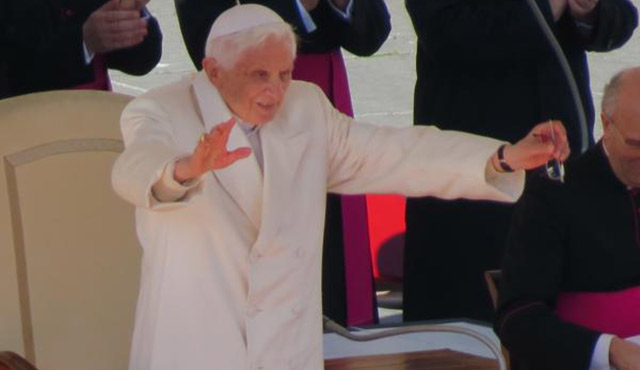Joseph Ratzinger, Pope Emeritus Benedict XVI, turns 90 this Easter Sunday, the same age of his predecessor, Gregory XII, when he died in 1417, two years after abdicating the papacy in order to heal the ruptures of the Great Western Schism. Benedict XVI presided over no schism in 2013, but the last four years—beginning with his own stunning retirement—have proven so dramatic no scenarist, from Dan Brown o Francis Coppola have ever dared attempt such a plot.
If the world did a quizzical double take when Benedict XVI stepped down, as if they had never before even noticed him, it stopped dead in its tracks when the new man in white stepped out on March 13, 2013. It was an image that would become the subject of cardboard cutouts and gushing love letters from the likes of Rolling Stone. He would become known simply as Francis.
But there would be no Pope Francis without a Pope Benedict XVI. Joseph Ratzinger never wanted the papacy, but as in so many other areas of his life, it was just another call to service. In his retirement he has now survived longer than any abdicate pope before him. Both Gregory XII and Celestine V, in the 1290s, lived only two years after they relinquished the Chair of Peter. But Benedict is now four years into his retirement.
Because of Benedict, the door is now ajar for future papal resignations. And Benedict has shown that even though he is a retired pope, the Church is now led by another, the 266th Bishop of Rome. Meanwhile, Benedict has promised a life of prayer, and we as Church need those supplications. A day before becoming Benedict, 78-year-old Joseph Ratzinger warned of a “dictatorship of relativism” he feared would most hamper the faithful themselves in not letting other distractions take their eyes from the gaze of Christ Jesus. Francis adopted the phrase and made it his own, in his first trip outside Rome, to Lampedusa, accusing a sophisticated world of wallowing in the “globalization of indifference.”
In the four years of the Francis pontificate, he has upturned expectations. But in his own quiet way, Benedict XVI was no less the revolutionary. He was strident in reintroducing the living face of Jesus to peoples who instead of deepening their faith were giving themselves over to the digital age of distraction. Now, for as much as the Church has been criticized for being unchanging, it now has two living popes, one in retirement, and one very much active. And so, life continues. Benedict still yet lives behind the silent walls of the Vatican monastery he now calls home. Francis has forced the issue of what, why, and how the Church believes what it believes in a public forum.
With a lifetime of Jesuit spirituality behind him, Francis has captured the imagination, with images of outreach and compassion seizing the world. A church of the streets, a church of chaos, a field hospital, the smell of sheep. A God of surprises. And, of course, Who am I to judge? All of this is possible because Francis lives in the confidence of his faith. He knows the staggering genius of Joseph Ratzinger and Karol Wojtyła before him has given the faithful decades of intellectual fruit. Armed with that knowledge, Francis believes, one can freely “go into the deep.”
Though not a Jesuit, Joseph Ratzinger has his own grasp of Ignatian spirituality: an epic display of discernment that led to his decision to resign. Once stepping down, and turning the keys over to the Argentine Jesuit, he exercised another example of St. Ignatius’ teachings: detachment. His abdication in the public view may seem like weak leadership, because we are used to leaders holding on far too long. Benedict’s stepping down resembles the tradition in Japan’s Heian period when emperors would abdicate in their 30s, many of whom would live to see their great-grandsons assume the throne.
Benedict, a hitherto orthodox pope whose unorthodox exit from the world’s stage may be his greatest legacy. His 90th birthday occurs on the greatest Catholic feast, the Easter light of Resurrection, a new spiritual springtime for the soul. Perhaps that act of freedom the German bookworm accomplished against all odds has bolstered Francis’s own nosedive into the messiness of life: When he knows he can’t continue, that he can’t do it all alone, there is now precedence to leave it to others to continue. After all, Moses bequeathed entering the Promised Land to Joshua, John the Baptist descended as Christ ascended, and Christ Himself commissioned the apostles to finish what He set out to do.
Passing on the keys of the kingdom: the story, essentially, of Christianity.
Learn more at the upcoming OC Catholic Book Club event, featuring author James Day and his new book, “Father Benedict.”
Click here for details.

